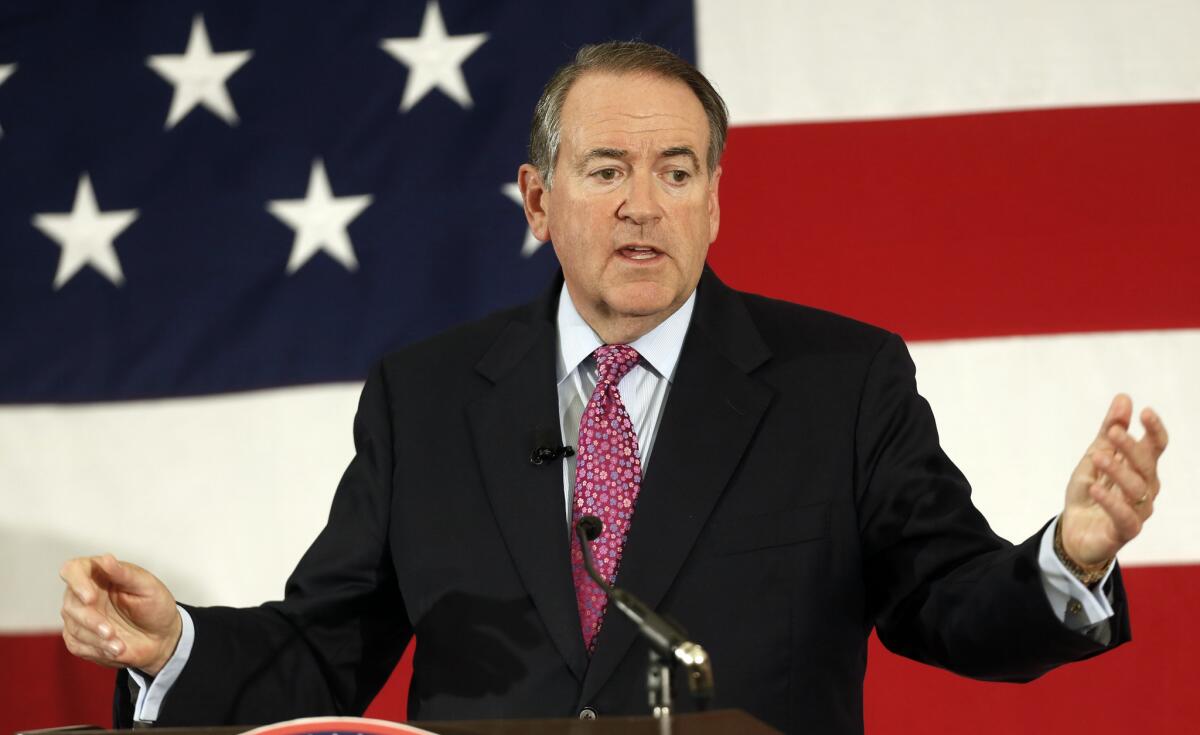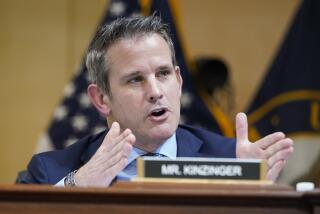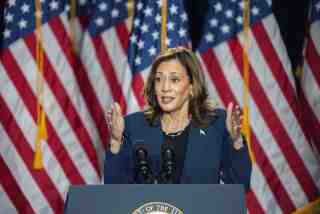Mike Huckabee joins White House race, sets sights on ‘higher ground’

Former Arkansas Gov. Mike Huckabee speaks at the Republican Leadership Summit in Nashua, N.H., in April.
- Share via
Mike Huckabee, the folksy former governor, preacher and television host, entered the 2016 presidential race on Tuesday with a base of loyal supporters from his prior White House run, but he faces a cast of potential rivals that is larger and stronger than in 2008.
A favorite of social conservative and evangelical voters, Huckabee, 59, has remained in the public eye and in voters’ living rooms through a Fox News show. But the former Arkansas governor has been out of office for more than eight years and will be running against some Republican candidates who are calling for generational change.
Huckabee announced his presidential bid in Hope, Ark., where both he and former President Bill Clinton grew up. The lessons he learned there -- from praying twice daily in school, to his parents’ instilling the importance of hard work and the golden rule, to learning how to safely handle firearms -- grounded his life and shaped his view of the exceptional nature of the United States, Huckabee said.
“Folks, it is a long way from a little brick rent house on 2nd Street in Hope, Ark., to the White House. But here in this small town called Hope, I was raised to believe that where a person started didn’t mean that’s where he had to stop,” Huckabee said, before unveiling a campaign motto. “I always believed that a kid could go from Hope to higher ground.”
Huckabee criticized the national debt, joblessness, foreign policy, polarization and treatment of veterans under President Obama, who he said won the White House as an inexperienced freshman senator who gave “great speeches.”
“We were promised hope but it was just talk, and now we need the kind of change that really could get America from hope to higher ground,” Huckabee said, before turning to his tenure in Arkansas. “… I learned how to govern and I learned how to lead.”
Huckabee said he worked with a then-Democratic-controlled legislature to cut taxes, rebuild roads, improve student test scores, raise family incomes and fight corruption.
If elected president, Huckabee pledged to not cut Social Security and Medicare benefits and to overhaul the tax system. A balanced federal budget, term limits on the judiciary and Congress, and a muscular foreign policy would also be top priorities, he said.
“We will no longer merely try to contain jihadism, we will conquer it,” Huckabee said. “We will deal with jihadis just as we would deal with deadly snakes. And let there be no doubt, Israel will know, as will the whole world, that we are their trusted friend, and the ayatollahs of Iran will know that hell will freeze over before they get a nuclear weapon.”
Huckabee is the sixth GOP candidate to officially enter the race. On Monday, Dr. Ben Carson and businesswoman Carly Fiorina announced long-shot plans to seek the White House, joining a trio of Republican senators who previously declared their candidacies — Ted Cruz of Texas, Rand Paul of Kentucky and Marco Rubio of Florida.
Chief among the obstacles Huckabee faces are rivals who appeal to the same bloc of voters that propelled Huckabee’s first-place finish in the 2008 Iowa caucuses — and who have a proven fundraising prowess that he lacked in that campaign, when he raised $16 million.
“In 2007 and 2008, people gave him a pass for not being able to raise a lot of money because no one knew who he was. Now everyone knows who he is,” said Bob Vander Plaats, who served as Huckabee’s Iowa co-chairman in 2008 and is currently uncommitted. “Can he back that up with the finances to run a top-tier campaign?”
Huckabee acknowledged the importance of fundraising.
“I’m going to let you in on a little secret: I never have been and I’m not going to be the favored candidate of those in the Washington-to-Wall Street corridor of power. I will be funded and fueled not by the billionaires, but by working people across America,” Huckabee said.
He urged supporters to make small, monthly donations before quipping, “Rest assured, if you want to give $1 million, please do it.”
Huckabee was not regarded as a serious White House candidate in 2008 until his surprise come-from-behind win over former Massachusetts Gov. Mitt Romney in Iowa. Huckabee’s success against the much-better-funded Romney was in part due to his lack of competition — conservative alternatives either decided not to run (Kansas Gov. Sam Brownback) or flamed out (actor and former Tennessee Sen. Fred Thompson).
The potential GOP field for 2016 of nearly two dozen candidates includes several who align with religious conservatives, notably Cruz and Gov. Scott Walker of Wisconsin.
Others eyeing the White House who appeal to evangelicals include former Texas Gov. Rick Perry, Louisiana Gov. Bobby Jindal and former Pennsylvania Sen. Rick Santorum, the victor of the Iowa caucuses in 2012. Paul is also courting religious voters.
“People, just by nature, are kind of drawn to the new car smell, so people are going to want to take a test drive, kick the tires, and sit inside all the new cars, look at all the new candidates and see if that’s the direction they want to go,” said Vander Plaats, president of the Family Leader, an Urbandale, Iowa-based Christian conservative group. “For Huckabee, his hope is going to be, ‘Let’s just persevere, stay the course, and once the new car smell wears off a little bit,’ ” hope that his followers return to the fold.
A poll by NBC and the Wall Street Journal released Monday, however, shows that just over half of registered GOP voters said they could see themselves casting a ballot for the former governor, well below support for Rubio, Walker and former Florida Gov. Jeb Bush.
Huckabee’s campaign sees a path to the nomination that is staked on Iowa and South Carolina, which are both dominated by evangelical voters and hold two of the first nominating contests in the nation. (Immediately after announcing his presidential bid, Huckabee planned to travel to these states for a “Factories, Farms & Freedom” tour.)
Successful showings there, according to a Huckabee advisor, would provide the candidate with momentum in March’s proposed “SEC primary” of several Southern states, named after the National Collegiate Athletic Assn.’s Southeastern Conference.
Huckabee’s announcement speech was laced with appeals to religious voters, including several references to his faith, and warnings that Christianity was being criminalized by the courts, and that the nation had lost its moral way because of the tens of millions of babies who have been aborted.
Huckabee’s greatest strength is his skill on the stump. His roots as a Baptist preacher are on display in the retail campaigning that is de rigueur in the early states. A quintessential happy warrior, Huckabee frequently quipped in 2008 that while he was conservative, he wasn’t angry about it.
Among Huckabee’s core supporters, the devotion remains.
“It’s kind of like first love,” said Craig Robinson, founder of the Iowa Republican website. “They’re not the type of people who are trying to be wooed by some other campaign. They held out hope he would run in 2012; they’re the kind of people who never even shopped the field because Mike Huckabee is their guy.”
Huckabee hit populist notes before it was commonplace among GOP politicians. He connected with working-class voters by pointing to his poor upbringing — the first male in his father’s line to graduate from high school; one generation removed on his mother’s side from dirt floors and outhouses.
Country vs. country club was a constant contrast Huckabee drew against Romney, and one he will likely make against Bush, who is expected to run. Both men are the descendents of wealthy, politically connected families.
As Huckabee noted that he gave up his lucrative Fox News job to run for the White House, he slapped at Bush, several of his GOP rivals who hold elected office, and Democratic front-runner Hillary Rodham Clinton, though not by name.
“I don’t have a global foundation or a taxpayer-funded paycheck to live off of. I don’t come from a family dynasty, but a working family,” he said. “I grew up blue collar, not blue blood.”
Fundraising rules have loosened considerably since Huckabee last ran, and one wealthy benefactor can keep a candidate afloat through a Super PAC. That allowed Santorum to carry on in the 2012 primary campaign long after it became clear that Romney would be the GOP nominee. It’s unclear whether Huckabee has a patron willing to spend millions of dollars on his effort.
Huckabee was the target of criticism that he wasn’t sufficiently conservative because he has strayed from party orthodoxy. He was castigated for supporting some tax increases when he was governor. He supported the closure of the detention facility in Guantanamo Bay. He flip-flopped on immigration and the Cuban embargo.
All of that is likely to be exploited by his rivals.
“The field is so strong this time, it’s going to be extremely difficult for Huckabee,” said Sam Clovis, a political science professor at Morningside College in Iowa and an influential conservative former radio host in the state. “I don’t know what his ceiling is, but it’s not nearly as high as it was.”
Follow @LATSeema for political news.
More to Read
Get the L.A. Times Politics newsletter
Deeply reported insights into legislation, politics and policy from Sacramento, Washington and beyond. In your inbox twice per week.
You may occasionally receive promotional content from the Los Angeles Times.








